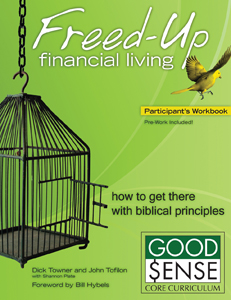Review of Freed-Up Financial Living: How to Get There with Biblical Principles”
Reviewed by the Rev. Rosanna Anderson, Associate Director of Stewardship Ministries
 Freed-Up Financial Living: How to Get There with Biblical Principles, Participant’s Workbook
Freed-Up Financial Living: How to Get There with Biblical Principles, Participant’s Workbook
by Dick Towner and John Tofilon with Shannon Plat.
Foreword by Bill Hybels.
Good $ense Core Curriculum.
Willow Creek Resources, 2008 (158 pages).
Leaders at Willow Creek Community Church in South Barrington, Illinois, have developed a series of materials and resources as part of the Good $ense Movement for biblical money management. This small-group program could be an excellent part of your church’s year-round stewardship plan. The workbook has an accompanying DVD of teaching materials for use with groups of people from your church or wider community.
Dick Towner, John Tofilon, and Shannon Plate, the authors of this resource, believe that God wants us to be free from “binding” views of money. “The more we become financially faithful,” they explain, “the closer we get to being financially free” (page 94). Many people today are struggling with financial issues, such as paying off loans and credit card debt. The authors identify three cultural myths that can undermine our efforts to live faithfully: “Debt is expected and unavoidable. Things bring happiness. A little more money will solve all my problems” (page 16). These myths affect us more than we realize, creating a tug of war between the “Pull of the Culture vs. the Mind and Heart of God” (page 19ff.). Yet the authors are hopeful that each of us can move from “foolish to faithful” ways of dealing with money (page 19). They urge us to remember God’s assurance through the Apostle Paul, “I can do everything through [Christ] who gives me strength” (Phil 4:13). This good news also applies to our financial lives.
The workbook begins with a helpful “Pre-Work” section to be completed before group discussions begin. This is designed to help people begin to apply the principles to daily life. Tools are provided to help people assess their current financial situation and think about their monetary goals. An especially meaningful exercise is the “Money Motivation Quiz” to assist in recognizing the beliefs that people hold about money, such as that it brings “freedom, security, power or love” (pages 13-16). Narrative instructions help individuals explore their “Money Autobiography” (page 17). Couples who go through the process together receive their own copies of the quiz and instructions about how to interpret the results. This way, they can delve more deeply into their own history and beliefs about money before comparing notes. Both parties will learn more about themselves and understand better the areas they may need to address to align their views as they seek to move forward together to greater financial health.
The authors present a vision for qualities that each person can develop in a faithful perspective on money. They present a progression of characteristics; namely: “diligent earner, generous giver, wise saver, cautious debtor, and prudent spender” (pages 33-84). Each quality is discussed realistically to help readers understand the factors that could trip them up when they seek to change or grow in each area. The authors offer practical tips to deal with challenges and suggest individual activities. All the categories are based on Bible passages that are included an excellent appendix: “Biblical Financial Principles” (pages 153-154). These passages could be used one at a time as inspirational quotations in worship bulletin inserts or church newsletters.
Ken Sloane, Director of Stewardship Ministries, recommends this book because it invites people to engage in a key element of stewardship in healthy congregations: self-examination. Recently, he presented an excellent webinar on why you should lead this course, including a pastoral view of the financial struggles that many in our country and congregations are facing. He suggests wise ways to approach and promote this program in your church and wider community. He also describes key steps that you could take to implement this approach in your context. The webinar’s title is “Freed Up Financial Living: Start This Program at Your Church!” It originally aired on March 13, 2014. It is available now as an archived webinar at www.umcdiscipleship.org/resources/freed-up-financial-living-start-this-ministry-in-your-church.
Contact Us for Help
View staff by program area to ask for additional assistance.
